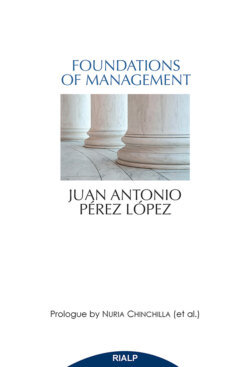Читать книгу Foundations of management - Juan Antonio Pérez López - Страница 21
На сайте Литреса книга снята с продажи.
McGregor: Theory Xand Theory Y
ОглавлениеPerhaps the most comprehensive discussion attempting to synthesize the theories we have mentioned so far (apart from the ones from other studies on motivation being conducted at the same time) is to be found in Douglas McGregor, with his famous Theory X and Theory Y as alternative approaches to management as set forth in his classic work The Human Side of Enterprise5.
In this work, McGregor acknowledges that at the heart of any theory on how to manage people, there is always a series of hypotheses on human motivation. In light of the development of the study of motivation, he states that there is a body of generally accepted theory that can be used as a basis for a new conception of management, which he calls Theory Y.
This theory is based on the consequences deriving from the theories on motivation described above (and other similar theories) which analyzed motivation within the context of problems of productivity, worker satisfaction, control, etc., in the companies. Theory Y is a management theory based on a conception of the company as a social organism—a psycho-sociological paradigm—and, consequently, the opposite of Theory X, which corresponds to a conception of management characteristic of a mechanistic model or paradigm of the company.
In his subsequent comments on Herzberg's theory, McGregor establishes a very important distinction between the factors affecting motivation. McGregor distinguishes between what he calls extrinsic factors and intrinsic factors.
The former6 are the ones usually associated with the satisfaction of the lower-order needs in Maslow's hierarchy and can be controlled “from outside” the individual: these consist of compensations, incentives, punishments or sanctions that “someone” other than oneself gives or takes away to control one's performance.
The intrinsic factors, on the other hand, are more closely related to the satisfaction of higher-order needs as a direct result of a person's activity. The “sense of achievement,” learning, satisfaction related to feeling responsible for something: all these are examples of intrinsic factors.
For McGregor, the factors that motivate intrinsically in the performance of a task are properties of a human system and represent a potential strength not present in mechanical systems. In the latter, action must be triggered externally by extrinsic factors. In the former, the possibility exists for action to be performed for the sake of intrinsic motives. Basically, Theory Y conceives of the manager as someone who not only motivates by offering external stimuli (incentives), but who above all is able to release people's energy to motivate themselves with the intrinsic results of their action.
McGregor goes no further than this and, with respect to the content of the extrinsic factors, confines himself to noting their connection with Maslow's lower-order needs and with Herzberg's hygiene factors; he relates intrinsic factors to Maslow's higher-order needs and to Herzberg's motivating factors. However, the match is not exact. Finally, McGregor does not fully accept the dynamism by which Maslow accounts for the appearance of motivation towards the satisfaction of a higher-order need.
